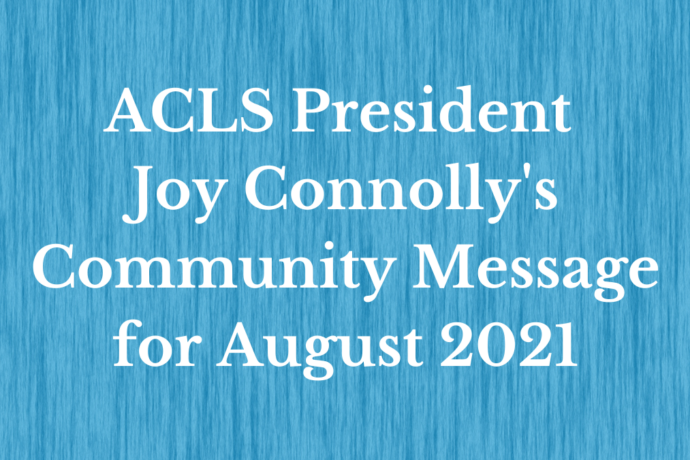ACLS Community Message for August 2021

While we anticipate a gradual return to working together in our midtown Manhattan office in early September, we’re keeping a close eye on the Delta variant. We’re also following reports on the factors underlying low vaccination levels around the country. How much is due to misinformation and distrust and how much to limited access to health care, transportation, and paid sick days?
Like many other wicked problems facing us, this is a complex question that requires collaborative humanistic study and analysis. This work doesn’t happen on its own; it needs institutional support to thrive. So I’m glad to see Morton Shapiro of Northwestern publicly encourage schools to develop cross-disciplinary teams of scholars “to examine the great issues of the day.” Like President Shapiro, I see great potential for scholars working together – and not just on issues in the headlines.
For all its drawbacks, Zoom has given conversation and collaboration a boost. The intense face-to-face conversations it compels are spurring serious reflection about the institutional, pedagogical, methodological, and intellectual futures of our fields here at ACLS and among scholars all over the world. I’ve written about our ongoing future-oriented work in the Luce Design Workshop and the Intention Foundry and will have more to say in coming months.
I also see right now as a timely moment to think about the conventional methods and modes of scholarly practice: how we choose research topics, collect evidence, and make arguments and counter-arguments – and how we pass these choices onto the next generation. The cluster of essays curated by Pardis Dabashi featured in the October 2020 issue of PMLA is one example of fresh thinking about scholarly argument I’ve found useful. Are humanists and social scientists best served by a single standard of argumentation or more than one? Ought we to base our claims on the rejection of earlier work or on dialogue with it? Shall we imitate legal models of argument or draw on the intuitive qualities of artworks?
Some scholars worry (as Dabashi and her contributors note) that these questions will open up an “anything goes” mentality that could play into the hands of hostile critics. My hope is that we see debates over change about method and pedagogy as well as over institutional questions in a more generous and experimental frame of mind.
In her recent book The Sum of Us: What Racism Costs Everyone and How We Can Prosper Together, Heather McGhee advocates for such a frame of mind. McGhee (a panelist for our next virtual event “The Value of a Degree in the Humanities & Social Sciences” on September 14, I’m happy to say) argues that white Americans have long thought of social goods as a zero-sum game where any change leads to loss – specifically, where gains by another group come at the expense of white people. In the place of this mentality, she argues for a “win-win” approach. When a city re-opens a swimming pool that had been closed to avoid integration, for example, everyone gains.
McGhee is writing about American society, not academia. But her book has helped me see more clearly why conversations about change can create anxiety and resistance, and how important it is to remember that we all win – not only when more people and diverse types of people engage in humanistic study, though that is a good in itself, but when research methods, valued topics, and modes of scholarly communication evolve as a result. With this in mind, I’m inspired by the NHA’s amazing collection of projects in publicly engaged humanities. And I applaud the growth of resources that spread the word about new approaches to teaching and research, particularly those offered by our member societies.
Wishing everyone a restful August, and sharing hope for a smooth academic year!

Joy
Sign up for the monthly ACLS Community Newsletter, as well as announcements and updates about programs, events, and more.

